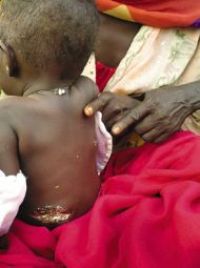Human Rights Commission approves resolution condemning abuses in Sudan
By ALEXANDER G. HIGGINS
GENEVA, Apr 21, 2005 (AP) — The U.N. Human Rights Commission adopted a resolution Thursday condemning abuses in Sudan, accepting compromise wording on improving the situation in the embattled Darfur region.

|
|
Mihad Hamid, age 1, shot in the back as she and her mother fled gunship attack, in Sudan’s Darfur region. (Brian Steidle).. |
The resolution, passed by consensus and adopted without a roll call vote, had support from Sudan and other African nations, the United States, the European Union and others. It was approved after the EU withdrew a more strongly worded document.
The final resolution was the result of weeks of negotiations between the EU, the United States and African nations.
The African countries agreed to remove wording that praised the Sudanese government’s steps to improve the situation in Darfur, while the Western countries dropped specific condemnation of the Sudanese government.
The resolution said, “The commission condemns continued, widespread and systematic violations by all parties of human rights and international humanitarian law” in Darfur. It specifically condemned “the violence against civilians and sexual violence against women and girls, destruction of villages, widespread displacement and other violations.”
Although the resolution didn’t specify the government, human rights organizations have accused Khartoum of being responsible for much of the violence either directly or through militias it backs in putting down a rebellion.
Former U.S. Senator Rudy Boschwitz, who heads the United States delegation, said that while there had been improvements overall in Sudan in recent weeks, “the terrible tragedy continues in Darfur.”
“Violence, atrocities and crimes against humanity regularly occur,” he said. “Attacks on humanitarian workers continue. Displaced people, especially women, are vulnerable to murder, rape and abuse.
“While the African Union has done a commendable job of reducing violence in areas it patrols, the security situation remains precarious in large portions of Darfur,” Boschwitz said.
Sudanese Ambassador Elsadig Almagly said Sudan joined in the consensus “on the understanding that cooperation is the best means” to improve the situation in Darfur.
Welcoming the lack of a specific condemnation of the government, Almagly said “naming and shaming” countries on a selective basis amounted to holding “double standards.”
The compromise was signaled earlier Thursday when the European Union withdrew a proposal that would have “condemned” the government for abuses that might amount to “war crimes.”
Diplomats said the shift had been widely expected. The EU and the United States had been trying hard to win African support for a human rights resolution on Sudan before the commission winds up its six-week session Friday.
“The EU is pleased to note today that cooperation with the African group and the country concerned” made it possible to reach a compromise, said Luxembourg diplomat Anne Goedert, speaking for the 25-nation bloc.
African nations have been holding firm to their proposed resolution that refrained from singling out the Sudanese government but only “expresses serious concern” about “the continued violations by all parties.”
But a U.S. official said that during the negotiations “the objective of everybody along the way was that if we could find language which is acceptable to all of us then we would join together and not have any confrontation over the language.”
The commission was supposed to vote on the resolution last week, but the ballot was rescheduled because of the behind-the-scenes negotiations.
Western nations have been urging Khartoum to halt attacks by government-aligned Arab militias that launched a counterinsurgency campaign in 2003 against ethnic African rebels. The rebels launched their fight over what they view as discrimination by the Arab-dominated government.
The Darfur conflict has left at least 180,000 people dead, many through disease and hunger, and has displaced more than 2 million people, according to U.N. estimates.
_
Associated Press writers Sam Cage and Bradley S. Klapper contributed to this report.
